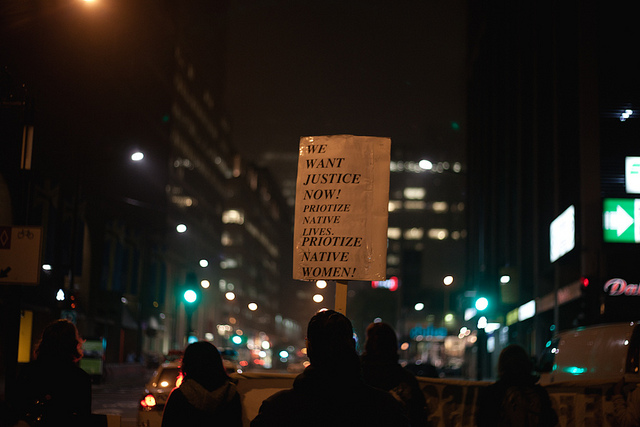The Inter‑American Commission on Human Rights has provided a direct answer to Prime Minister Harper: Yes, the murders and disappearances of Indigenous women and girls are a ‘sociological phenomenon’.
The Inter-American Human Rights Commission issued a breakthrough report on Monday on its investigation into Missing and Murdered Indigenous women in British Columbia. This investigation was requested by the Native Women’s Association of Canada and the Canadian Feminist Alliance for International Action in March 2012. The Commission makes key findings and recommendations which apply in all parts of the country and to all levels of government.
Of course, the murders and disappearances are crimes. And the Inter‑American Commission is clear that Canada has an obligation under international human rights law to ensure that the response of the police, prosecutors and judges is swift, diligent, effective and unbiased, which it has not been so far.
But the Commission is also clear that that the scope of Canada’s obligations is much broader. Canada has to address the risk factors that cause and perpetuate the violence. Specifically, the Commission tells Canada that it must combat the poverty of Indigenous women, improve education and employment, guarantee adequate housing and address the disproportionate application of the criminal law against them.
The root causes of the high levels of violence against Indigenous women, the Inter‑American Commission says, lie in a history of discrimination beginning with colonization and continuing through laws and policies such as the Indian Act and residential schools. This history laid the foundations for pervasive violence and created the risks Indigenous women face today, through economic marginalization, social dislocation and psychological trauma.
Because of the strong connection between the greater risks for violence and the social and economic inequalities that Indigenous women face, governments must address their social and economic marginalization.
In this way, the Inter‑American Commission directly refutes the Prime Minister’s claim that this is a matter of individual crimes, not a sociological phenomenon. The Commission says clearly that there is a broad and known pattern of heightened risk and vulnerability, and the risk factors must be addressed.
As the Inter‑American Commission makes clear, the international law standard of ‘due diligence’ which applies to Canada includes obligations to prevent and remedy the violence and Canada’s obligations can not be fully satisfied by effective investigation, prosecution and punishment alone.
It is no surprise then that the Inter‑American Commission finds that implementing the Oppal Inquiry’s recommendations in British Columbia is necessary, but just “a starting point for reforms to the investigative function.”
Nor is it any surprise that the Inter‑American Commission also strongly supports a nation‑wide inquiry. It says that there is much more to be understood and much more to be acknowledged.
Now it is not only Aboriginal women, and their many allies, telling the federal government that there is a need for a national co-ordinated response to the long‑standing and persistent sex and race discrimination which they experience. A leading international human rights body has declared that Canada is required to do this in order to fulfill our human rights obligations.
Sharon McIvor is a lawyer and member of Lower Nicola Indian Band. Gwen Brodsky was counsel to the Native Women’s Association of Canada and the Canadian Feminist Alliance for International Action in the IACHR investigation. Shelagh Day is the Chair of the Human Rights Committee of the Canadian Feminist Alliance for International Action, and expert on international human rights law.
For background on the IACHR investigation, click here.
This piece originally appeared on Blogging for Equality.
Photo: flickr/Thien



